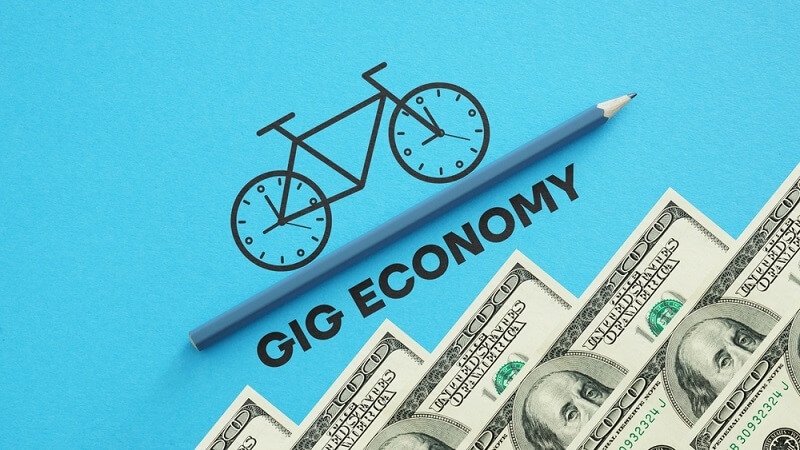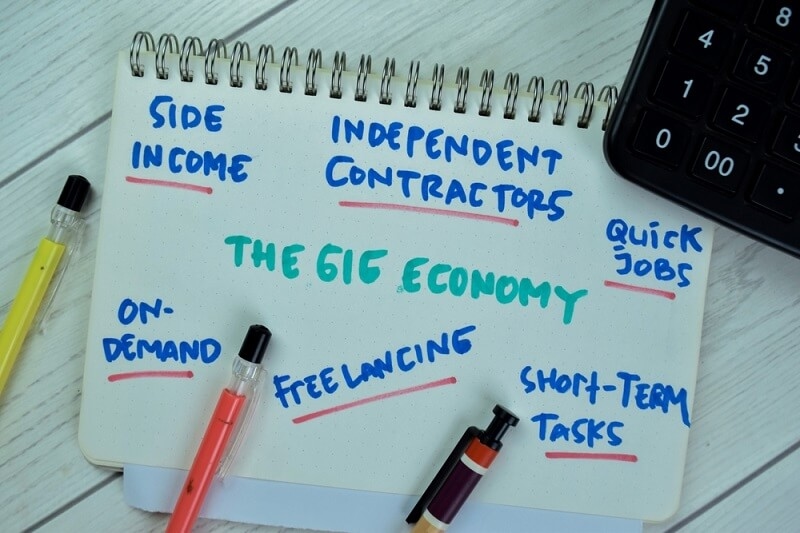Legal Topics

What Are Gig Economy Jobs? Legal Rights You Must Know
The way people work has changed dramatically in the last decade. Traditional 9-to-5 jobs no longer define the only career path. Instead, the gig economy has grown into a global shift that gives people more control over how, when, and where they work. But while the flexibility is appealing, it also raises serious questions about rights, protections, and long-term stability. If you’ve ever wondered what are gig economy jobs, how they function, and what legal rights freelancers actually have, this guide will break it all down in clear terms.
What Are Gig Economy Jobs?
At an elementary level, the very definition of the gig economy rests on short-term, sporadic jobs instead of jobs that come with permanent employment or are full-time jobs. The jobs in the gig economy stack up from diverging Uber or DoorDash for delivery or umpiring freelance graphic design projects, writing, coding, and consulting; the gig economy stands for it all. Contrary to jobs that keep you on payroll, most gig workers stand as independent contractors who, in turn, decide whether to take up a project or not, set their hours of work, and sometimes put a price on it themselves. This autonomy is one of the biggest advantages the gig economy affords; however, a downside to it is inconsistent income and the lack of legal protection.
Someone asks, "What is a gig economy job?" Simply put, they are freelance or contract-based roles that afford flexibility but usually lack basic benefits such as health insurance, paid leave, and retirement plans.
Gig Economy Trends You Should Know
The rise of platforms like Uber, Upwork, Fiverr, Instacart, and TaskRabbit shows how much demand there is for on-demand services and flexible skills. From gig economy trends, we come to know that platforms in the gig economy now serve millions of workers either as a main source of income or as an income supplement.
Here are a few key trends shaping the market:
- Growth during uncertainty ––Economic downtimes, lay-offs, and inflation push people more toward gig work as a means to borrow money for short duration.
- Tech-driven platforms – Apps and websites are the exciting technical bits that connect freelancers instantaneously to clients.
- Shift toward skilled gigs – No longer just delivery drivers and rideshare drivers. Now marketers, writers, programmers, and consultants also thrive in freelance.
- Generational adoption – Younger workers, especially Gen Z and Millennials, see freelance work as a normal career choice rather than just a temporary fix.
These gig economy trends show that flexible work is here to stay. But with growth comes an even bigger debate about worker protections.
More to Discover: Explore Different Types of Agreements: A Comprehensive Guide
Gig Economy Advantages That Attract Workers

There’s a reason millions of people are moving away from the traditional workforce. The gig economy advantages are real and worth highlighting:
- Flexibility – You set your own schedule. Want to work nights, weekends, or just a few hours? You can.
- Multiple income streams – Freelancers aren't bound to one employer; they could choose to earn from diverse clients or platforms.
- Skill-based growth – Develop your portfolio and reputation and ask for more money.
- Work-life balance – Maybe several parents, students, and caregivers are choosing the gigs for the reason of managing their personal commitments along with professional commitments.
These advantages given by the gig economy appeal to the worker, but, on the contrary, they also highlight the grounds on which many workers are fighting to be given better legal protection.
The Downside: What Freelancers Lose Out On
Gig-working advantages are there to be enjoyed, but the shortcomings stand tall if you even consider them. Independent contractors usually end up outside the safety net of fundamental rights enjoyed by employees. Including those of:
- No health insurance, unless procured individually
- No unemployment if work slows down or comes to an abrupt end
- No workers' compensation if hurt on the job
- No minimum wage guarantee in many cases.
This is why the whole debate about freelancers and independent contractors is, so to speak, important.
Legal Rights for Freelancers and Independent Contractors
Classification is the biggest problem in the gig economy. If you’re an “employee,” you’re entitled to a range of protections under labor laws. If you’re labeled an “independent contractor,” you’re not. Most gig platforms classify workers as contractors, which saves them money but often leaves freelancers vulnerable.
Key Legal Questions
- Are you an employee or contractor? Courts and lawmakers have been debating this for years. Some states, like California, tried to tighten up the rules (with Assembly Bill 5) to regard many gig workers as employees.
- Do you have rights against discrimination? Yes—freelancers are still protected against discrimination based on race, gender, religion, or disability.
- Do you have contract rights? Absolutely. You are entitled to be paid for the work you complete under a valid contract, and you may pursue legal actions if your clients fail to pay you.
Some states also introduced "Freelance Isn't Free" laws requiring clients to pay contractors on time and in full.
Explore More: Choosing the Best Ownership Structure for Your Business
Future of Gig Economy and Worker Rights
The future of gig economy jobs depends largely on how lawmakers, courts, and businesses respond to the growing demand for flexible work. On one hand, companies rely on the contractor model to keep costs down. On the other, workers are demanding protections similar to traditional employees.
Here’s what to expect moving forward:
- Hybrid models – Some companies may offer “contractor-plus” models where freelancers get partial benefits without being full employees.
- More regulation – Expect stricter rules on timely payment, fair contracts, and possible minimum wage protections for gig workers.
- Increased bargaining power – As the freelance workforce grows, collective bargaining and freelance unions may become more common.
- Global adoption – The future of gig economy jobs isn’t limited to the U.S. International markets are rapidly embracing freelancing as well.
Balancing Gig Economy Advantages With Legal Protections
For many, the gig economy advantages outweigh the risks. The freedom to choose your clients, manage your workload, and set your own schedule is powerful. But without stronger legal frameworks, freelancers will continue to face uncertainty when it comes to healthcare, income stability, and retirement planning.
The solution isn’t eliminating gig work—it’s creating a balanced system where workers enjoy both gig economy benefits and basic protections. This balance is the real challenge for the future of gig economy regulations.
Practical Steps Freelancers Can Take Today
If you’re working in the gig economy, you don’t have to wait for lawmakers to catch up. You can protect yourself by taking a few key steps:
- Always use contracts – Written agreements protect you if a client doesn’t pay.
- Track your income – Stay on top of your taxes and consider quarterly payments.
- Get insurance – Health, liability, or disability insurance can protect you from financial setbacks.
- Diversify your income – Don’t rely on just one platform or client. Spread your work across multiple streams.
- Stay updated – Gig economy laws change often. Follow gig economy trends so you know your rights in real time.
Must Read: Proven Tips for Negotiating Event Contracts with Confidence
Final Thoughts
If someone asks you, “What are gig economy jobs?” the answer is straightforward—they’re flexible, short-term roles that allow you to design your career on your own terms. But behind the freedom lies a complex legal framework that freelancers need to navigate carefully.
The gig economy advantages and gig economy benefits are clear, but without stronger protections, many workers will continue to face challenges. As lawmakers and courts adapt, the future of gig economy jobs will likely bring new opportunities as well as new rules.
For freelancers, the key is balance: embrace the flexibility, protect yourself with smart practices, and stay informed about your rights.
Current Topics
1. How to Choose the Best Personal Injury Lawyer in the USA?
A personal injury lawyer...
2. How to Find the Right Attorney and Choose the Best Lawyer
Finding the right attorn...
3. Healthcare Compliance Rules Every Legal Pro Must Know
Here's the thing. Health...
4. AI ChatGPT Tools in Artificial Intelligence for Lawyers
The world of law is evolving at a pac...
5. What Are the Employment Laws Protecting Worker Rights?
In contemporary jobs, it...
6. Financial Resilience Explained for Stability & Success
Money is so cumulative i...
7. What Are Gig Economy Jobs? Legal Rights You Must Know
The way people work has changed drama...
8. Rights & Mediator's Role in Pregnancy Child Support 2025
The first idea that will come to the ...
9. Digital Courtrooms: VR Evidence & Remote Trials in 2025
Once upon a time, courtrooms were all...
10. How to Find a Good Lawyer Made Simple for Beginners
The first question that ...
